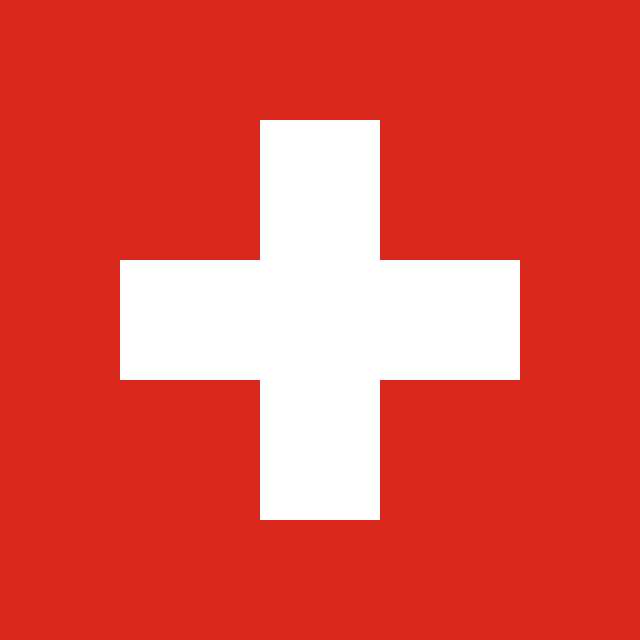Line 514:
{{Main|Religion in Switzerland}}
[[File:Glarus Stadtkirche Langhaus.jpg|thumb|right|The reformed church of [[Glarus]]]]
{{bar box
|title=Religion in Switzerland – 2013<ref name="CHReligion2011-2013">{{cite web |title=Ständige Wohnbevölkerung ab 15 Jahren nach Religions- / Konfessionszugehörigkeit, 2011-2013 |url=http://www.bfs.admin.ch/bfs/portal/de/index/news/01/nip_detail.Document.193976.xls |type=Statistics |format=XLS |publisher=Swiss Federal Statistical Office |location=Neuchâtel |year=2015 |website=http://www.bfs.admin.ch |language=German |accessdate=29 May 2015}}</ref>
|left1=religion
|right1=percent
|float=left
|bars=
{{bar percent|[[Roman Catholicism|Roman Catholic]]|DarkBlue|38.51|38.21%}}
{{bar percent|[[Protestant]]|DeepSkyBlue|30.13|29.83%}}
{{bar percent|[[Orthodox Christianity|Orthodox]]|Cyan|2.44|2.14%}}
{{bar percent|[[Christianity|Other Christian]]|LightSkyBlue|0.95|0.65%}}
{{bar percent|[[Judaism|Jewish]]|OrangeRed|0.55|0.25%}}
{{bar percent|[[Islam]]ic|LimeGreen|5.25|4.95%}}
{{bar percent|[[Buddhism|Buddhist]]|Yellow|0.82|0.52%}}
{{bar percent|[[Hinduism|Hindu]]|DarkMagenta|0.8|0.50%}}
{{bar percent|Other|Black|1.83|1.53%}}
{{bar percent|Unaffiliated*|LightGrey|21.72|21.42%}}
|
|caption=*''[[Agnostic]], [[Atheist]], or [[Theism|Theistic]] without church membership''}}
Switzerland has no official [[state religion]], though most of the [[cantons of Switzerland|cantons]] (except [[Canton of Geneva|Geneva]] and [[Canton of Neuchâtel|Neuchâtel]]) recognize official churches, which are either the [[Catholic Church]] or the (Protestant) [[Swiss Reformed Church]]. These churches, andalong inwith some cantons also the [[Old Catholic Church]] and [[Jewish]]other congregations, are financed by official taxation of adherents.<ref name="CHKirchenSteuer">{{cite web |title=Die Kirchensteuern August 2013|url=http://www.estv.admin.ch/dokumentation/00079/00080/00736/index.html?lang=de&download=NHzLpZeg7t,lnp6I0NTU042l2Z6ln1acy4Zn4Z2qZpnO2Yuq2Z6gpJCDdYR6fGym162epYbg2c_JjKbNoKSn6A-- |type=Document |format=PDF |publisher=Schweizerische Steuerkonferenz SSK, Swiss Federal Tax Administration FTA, Federal Depertment of Finance FDF |location=Berne |year=2013 |website=http://www.estv.admin.ch |language=German (French, or Italian) |accessdate=5 April 2014}}</ref>
[[Christianity]] is the predominant religion of Switzerland (about 71% of resident population), divided between the Catholic Church (38.21% of the population), the Swiss Reformed Church (26.93%), further [[Protestant]] churches (2.89%) and other Christian denominations (2.79%). There has been a recent rise in [[Evangelicalism]].<ref>{{cite web|url=http://www.christianpost.com/news/evangelical-churches-growing-fast-in-switzerland-63962|title=Evangelical Churches Growing Fast in Switzerland|publisher=Christian Post|accessdate=2015-06-07}}</ref> [[Immigration to Switzerland|Immigration]] has brought [[Islam]] (4.95%) and [[Eastern Orthodoxy]] (around 2%) as sizeable minority religions.<ref name="CHReligion2011-2013"/>
As of the 2000 census other Christian minority communities include Neo-[[Pietism]] (0.44%), [[Pentecostalism]] (0.28%, mostly incorporated in the [[Schweizer Pfingstmission]]), [[Methodism]] (0.13%), the [[New Apostolic Church]] (0.45%), [[Jehovah's Witnesses]] (0.28%), other Protestant denominations (0.20%), the [[Old Catholic Church]] (0.18%), other Christian denominations (0.20%). Non-Christian religions are [[Hinduism]] (0.38%), [[Buddhism]] (0.29%), [[Judaism]] (0.25%) and others (0.11%); 4.3% did not make a statement. 21.4% in 2012 declared themselves as unchurched i.e. not affiliated with any church or other religious body ([[Agnostic]], [[Atheist]], or just not related to any official religion).<ref name="CHReligion2011-2013"/><ref name="CHReligion2000">{{cite book |last1=Bovay |first1=Claude |last2=Broquet |first2=Raphaël |title=Eidgenössische Volkszählung 2000: Religionslandschaft in der Schweiz |url=http://www.bfs.admin.ch/bfs/portal/de/index/themen/01/22/publ.html?publicationID=1614 |date=30 September 2005 |publisher=Swiss Federal Statistical Office, December 2004 |location=Neuchâtel |language=German, French, or Italian |isbn=3-303-16073-2 |pages=122–129 |type=Publication |format=PDF |accessdate=22 December 2013}}</ref>
As of the 2000 census other Christian minority communities include Neo-[[Pietism]] (0.44%), [[Pentecostalism]] (0.28%, mostly incorporated in the [[Schweizer Pfingstmission]]), [[Methodism]] (0.13%), the [[New Apostolic Church]] (0.45%), [[Jehovah's Witnesses]] (0.28%), other Protestant denominations (0.20%), the [[Old Catholic Church]] (0.18%), other Christian denominations (0.20%).
[[File:Karte Religionen der Schweiz 2015.01.01.png|thumb|Religion in Switzerland (2015)]]
The country was historically about evenly balanced between Catholic and Protestant, with a complex patchwork of majorities over most of the country. [[Geneva]] converted to Protestantism in 1536, just before [[John Calvin]] arrived there. One canton, Appenzell, was officially divided into Catholic and Protestant sections in 1597. The larger cities and their cantons (Bern, Geneva, Lausanne, Zürich and Basel) used to be predominantly Protestant. [[Central Switzerland]], the [[Valais]], the [[Ticino]], [[Appenzell Innerrhoden|Appenzell Innerrhodes]], the [[Canton of Jura|Jura]], and [[Canton of Fribourg|Fribourg]] are traditionally Catholic. The [[Swiss Constitution]] of 1848, under the recent impression of the clashes of Catholic vs. Protestant cantons that culminated in the [[Sonderbundskrieg]], consciously defines a [[consociational state]], allowing the peaceful co-existence of Catholics and Protestants. A 1980 initiative calling for the complete [[separation of church and state]] was rejected by 78.9% of the voters.<ref>[http://www.admin.ch/ch/d/pore/va/19800302/index.html Volksabstimmung vom 2. März 1980] admin.ch. Retrieved on 2010</ref> Some traditionally Protestant cantons and cities nowadays have a slight Catholic majority, not because they were growing in members, quite the contrary, but only because since about 1970 a steadily growing minority became not affiliated with any church or other religious body (21.4% in Switzerland, 2012) especially in traditionally Protestant regions, such as Basel-City (42%), canton of Neuchâtel (38%), canton of Geneva (35%), canton of Vaud (26%), or Zürich city (city: >25%; canton: 23%).<ref>{{cite web |title=Ständige Wohnbevölkerung ab 15 Jahren nach Religions- / Konfessionszugehörigkeit, 2012 |url=http://www.bfs.admin.ch/bfs/portal/de/index/themen/01/05/blank/key/religionen.Document.21757.xls |type=Statistics |format=XLS |publisher=Swiss Federal Statistical Office |location=Neuchâtel |year=2014 |website=http://www.bfs.admin.ch |language=German, French, or Italian |accessdate=5 April 2014}}</ref>
==Culture==
|
 Article Images
Article Images